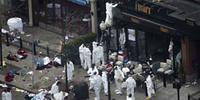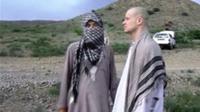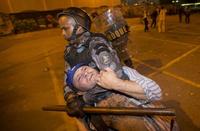-
Experts debate the vulnerability of Midwest cities to terrorist attacks

The crises in Syria and Iraq have increased worries about terror cells taking aim at American targets, specifically New York, Boston, and Los Angeles. As larger cities step up their counterterrorism efforts, however, analysts debate whether less populated cities in the Midwest are safe or just as vulnerable to terror attacks.
-
-
The “militarization of health care” threatening the health of local populations: experts
The surge in murders of polio vaccination workers in Pakistan has made headlines this year, but little attention has been devoted to the ethical issues surrounding the global health impact of current counterterrorism policy and practice. A new study traces the ways that the war on terror is incorporating medicine into warfare – what the researchers call “the militarization of health care” — threatening the health of local populations, increasing global health disparities, and causing profound moral distress among humanitarian and health care workers.
-
-
Historic proportions of Iraq’s military collapse raise questions about Iraq’s viability
“The scale of Iraq’s military collapse is of historic proportions,” one military analyst said. A recent assessment of the Iraqi military found that 60 out of 243 Iraqi Army combat battalions “cannot be accounted for, and all of their equipment is lost.” American military officials said an evaluation of the state of Iraq’s military revealed that five of the Iraqi Army’s fourteen divisions were “combat ineffective,” including the two that were overrun in Mosul. The United States has spent $1.7 trillion in Iraq since 2003, of which $25 billion were used to equip and train the post-Saddam Iraqi military. The United States received no return on its huge investment in Iraq, but it was hoped that at least the Iraqi military, U.S.-trained and U.S.-equipped, would provide a solid, professional foundation for a new Iraq. Developments in Iraq last week proved that this hope was illusory.
-
-
Obama orders 300 U.S. military advisers to Iraq (updated)
President Barack Obama yesterday announced he had authorized sending up to 300 U.S. troops to Iraq to help the Iraqi military cope with a rapidly advancing attack by Islamist fighters from the fundamentalist group ISIS. “It is in our national security interest not to see an all-out civil war in Iraq,” Obama said. While reiterating that he would not send combat troops to Iraq, the president said the United States would help the Iraqis “take the fight” to the militants, who he said pose a threat to Iraq’s stability and to American interests.
-
-
Obama orders 300 U.S. “advisers” to Iraq
President Barack Obama a few minutes ago announced he authorized sending up to 300 U.S. troops to Iraq to help Iraqi military forces cope with a rapidly advancing attack by Islamist fighters from the fundamentalist group ISIS. It is in our national security interest not to see an all-out civil war in Iraq,” Obama said. While reiterating that he would not send combat troops to Iraq, the president said the United States would help the Iraqis “take the fight” to the militants, who he said pose a threat to Iraq’s stability and to American interests.
-
-
Maliki says he will not step down to facilitate U.S. air strikes against ISIS
A spokesman for the Iraqi prime minister, Nouri al-Maliki, has said Maliki will not stand down in order to make it politically easier for the United States to launch air strikes against ISIS Sunni militants who have made rapid advances across Iraq, culminating yesterday (Wednesday) with taking control over Iraq’s largest oil refinery, located in Baiji, 130 miles north of Baghdad. The Islamists now control a third of Iraq’s territory. Many U.S. lawmakers, and many analysts of Iraq, consider the failed leadership Maliki — a Shi’a politician who, at Iran’s urging, has pursued a narrow sectarian policies which has alienated Iraq’s Sunnis and Kurds — as the reason for the willingness of the Sunni population in Iraq to welcome ISIS as a protector of Sunni interests, and the indifference shown so far by the Kurds in the face of ISIS gains.
-
-
ISIS insurgents take over Iraq’s largest refinery, continue advance toward Baghdad
Earlier this morning (Wednesday) ISIS Islamic militants took over Iraq’s biggest oil refinery, located near the town of Baiji, 130 miles north of Baghdad. The fall of the refinery is a major blow to the already-reeling government of Nouri al-Maliki. The refinery provides about 40 percent of Iraq’s refined oil needs, and if the supplies dry up, the Iraqi economy would be paralyzed within a few days, and Iraqi citizens would be without power or gas for their cars. As was the case since the ISIS campaign began late last week, the Iraqi military and security forces put up only a token resistance, with most of their units melting away and leaving their arms and equipment behind without even engaging the militants. Iraq is the second largest oil producer in OPEC.
-
-
Iraqis want to know the reasons for army’s rapid collapse
One of the more puzzling questions raised by the ease – and speed – with which a rag-tag group of Islamist insurgents gained control over about one-third of Iraqi territory is this: What happened to the Iraqi army that caused it to collapse in less than three days – three days in which, in any event, it hardly engaged in any fighting? What brought the curtain down on a force in which the United States had invested billions of dollars, a force which, according to two American administrations, was the best trained and armed military force in the Arab world? There are those in Iraq who believe the answers lie not in the military but rather in the political realm.
-
-
If Nouri al-Maliki stays in office, Iraq faces destructive descent into a long civil war
Throughout his two previous terms, Nouri al-Maliki managed to create various problems but failed to solve any of them. Instead of winning over the population of the heavily Sunni provinces, and through them Iraq’s wider Sunni community, al-Maliki’s Shiite-dominated government persistently alienated and discriminated against them. Before long, Sunni areas started to see protests, sit-ins and demonstrations against the policies of al-Maliki and his government. The prime minister’s response was to increase the presence of security and military forces, which were mainly staffed and headed by Shiite personnel. Thanks to his unwillingness to concede to the demands of the Sunni-majority provinces, instead resorting to the use of force, his struggle against the leaders of these provinces (and indeed most opposition Sunni leaders) reached the point of no return. Al-Maliki’s departure, and the formation of a government of national unity of technocrats that could put an end to corruption and at least restore basic services, could perhaps offer a chance for some stability. It would also help end the many disputes and problems al-Maliki has created with the Kurdish regional government, the Sunni provinces, and especially with his own Shiite coalition partners. His insistence on remaining in office will only hasten the start of a destructive and prolonged civil conflict — all too reminiscent of the catastrophe still unfolding across his country’s north-eastern border.
-
-
Pentagon is capable of tracking the Taliban 5 freed from Guantanamo: experts

Critics of the White House’s release of five Taliban prisoners (Taliban 5) from Guantanamo Bay to Qatar are concerned that the group will eventually return to the battlefield in Afghanistan, posing a threat to American forces. Secretary of State John Kerry has said that doing so will open the terrorists to possible drone strikes; but that requires knowledge of their whereabouts. How might intelligence analysts track the Taliban 5 during and after their stay in Qatar? Experts say that the Pentagon is capable of tracking the former detainees using algorithms that predict terrorists’ movements based on their personal history and network.
-
-
Terror court case in U.K. continues to be held in secret, alarming critics
A major terrorism trial in the United Kingdom has also become a media cause célèbre as media representatives challenge senior judges, leading to a case which is both mysterious and well known. That came after the Crown Prosecution Service (CSP) had persuaded the case judge that the entire trial should take place in secret. No further reasons for the case have been made public, and it still remains uncertain whether the full trial will be reportable.
-
-
How has Iraq lost a third of its territory to ISIS in three days?

The Islamic State of Iraq and the Levant (ISIL), also known as ISIS, has about 12,000 fighters in its ranks. About 8,000 needed only forty-eight hours to take Mosul, Iraq’s second largest city, although it was defended by more than 27,000 government troops. It took ISIL another twenty-four hours to gain control of about one-third of Iraq – facing little, if any, resistance from Iraq’s one-million-strong security apparatus. The reasons: After the U.S. occupation force, in 2003, dismantled Iraq’s professional military, a new Iraqi army was re-established from militia members and low-ranking members of the Ba’ath army. Senior officers in Saddam Hussein’s forces were dismissed, which gave rise to at least two security issues. Firstly, military officers of the previous army were steered toward terrorist groups. Secondly, Iraq’s new military suffered from the loss of expertise and military discipline instilled by their former officers. In addition, poor governance has led to widespread corruption in both political and military spheres. Military personnel are routinely reported to be soliciting bribes, especially in Sunni areas of Iraq.
-
-
U.S. begins evacuation of Baghdad embassy; Iranian general coordinating the defense of Baghdad
The State Department yesterday (Sunday) that non-essential employees at the U.S. embassy in Baghdad were being evacuated, but that the United States would remain “fully equipped to carry out its national security mission.” The Pentagon has ordered an aircraft carrier and two missile-carrying ships to the Persian Gulf, hinting at the possibility of imminent U.S. air strikes against the advancing Sunni insurgents. The Sunni insurgents who now control about a third of Iraq said Sunday that they had executed 1,700 Iraqi soldiers, stressing that all those who killed were Shi’as. Iran had sent 2,000 advance troops to Baghdad, and General Qassem Suleimani, the commander of the Qods Force of Iran’s Revolutionary Guard, is coordinating the defense of Baghdad.
-
-
World Cup security teams focus more on crime, protests – less on terrorism

During the 2014 FIFA World Cup, currently being held across twelve different venues across Brazil, security teams have extensively prepared for measures to be taken against crime and protest related to heated political unrest. American bomb-busting robots, Israeli surveillance drones, and German anti-aircraft tanks — an international assortment of security officials and measures – are just some of the pieces of the greater security apparatus protecting both players and fans.
-
-
Administration’s $5 billion counterterrorism (CT) fund met with questions, uncertainty
The White House’s proposed $5 billion counterterrorism (CT) fund designed to help U.S. officials train and equip allied countries to eliminate elements of al-Qaeda or organized terrorism. Some lawmakers and officials familiar with the issue are unsure whether the funds would be directed toward Syrian rebels, or distributed among African countries. Others are worried that the program may interfere with other initiatives meant to accomplish similar objectives.
-
More headlines
The long view
How Male Grievance Fuels Radicalization and Extremist Violence
By Haily Tran
Social extremism is evolving in reach and form. While traditional racial supremacy ideologies remain, contemporary movements are now often fueled by something more personal and emotionally resonant: male grievance.
